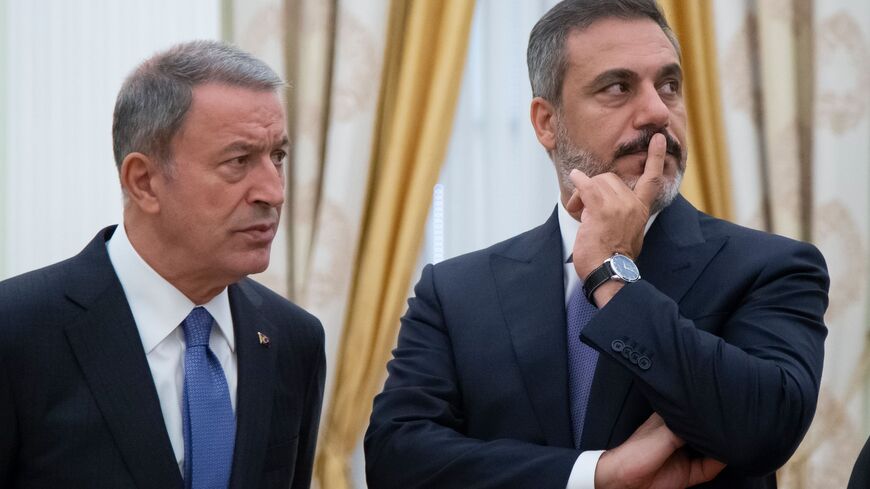ANKARA — Turkey’s shadowy and low-key intelligence chief Hakan Fidan is set to step into the limelight and take the helm of the country’s diplomacy after Turkish President Recep Tayyip Erdogan tapped him as the country’s new foreign minister on Saturday.
Fidan, who has headed the Turkish National Intelligence Agency (MIT) since 2010, is no stranger to the diplomatic world. In recent years as a spymaster he has engaged in back-channel diplomacy with the nation’s allies and foes across the globe.
Fidan, 54, has been one of the few confidants of the Turkish president, having continuously served in various positions since Erdogan became prime minister in 2003. Before taking over as intel chief, Fidan was already a subject of curiosity while he was acting as a special envoy of then-Prime Minister Erdogan in the now defunct peace process between the outlawed Kurdistan Workers Party (PKK) and the Turkish government.
Along with his predecessor at the MIT Emre Taner and other intelligence officials, Fidan, whose father is an ethnic Kurd, took part in the talks with the high-level leaders of the PKK in 2009. The peace talks that lasted from 2008 to 2015 were aimed at finding a negotiated solution to the country’s decadeslong Kurdish problem by disarming the group in its fight against the Turkish state for self-rule.
Fidan’s tenure at the MIT had a bumpy start in 2010 with a series of critical articles published in the Western and Israeli media questioning his loyalty to Turkey’s traditional partners including the United States and Israel. Late Israeli Defense Minister Ehud Barak publicly confronted the spy master’s appointment at the time. Barak claimed that Fidan had close ties with Iran, citing his role as Turkey’s governor of the International Atomic Energy Agency from 2008 until his appointment to the MIT.
Yet later years of his tenure saw the MIT becoming the sole dialogue channel between Turkey and Israel, as well other regional powers with which Ankara’s ties went sour. Fidan also met with his Syrian counterparts multiple times in the lead up to the Russian-mediated high-level political talks between Ankara and Damascus in 2022.
Turkey’s incoming top diplomat remains largely a mystery to the public as a result of having kept a low-key profile. He has never given any interviews during his career in the government, even as stories about him and the MIT were hitting the headlines, fueling public curiosity around the nation’s youngest spymaster.
Fidan became one of the first and most frequent sufferers of the fallout between Erdogan and his one-time ally turned nemesis US-based Sunni cleric Fethullah Gulen and his followers within the Turkish bureaucracy who opposed the peace talks.
The year 2012 marked a turning point in Fidan's career and the ties between Erdogan and the Gulen movement. A Turkish prosecutor summoned Fidan and other high-level intelligence officials to questioning, accusing them of “terror” ties over their roles in the talks with the PKK. The move led to a major standoff between the country’s intelligence and judicial bureaucracy. Fidan and the other intelligence officers refused to heed the summons in line with instructions of Erdogan. Following the standoff, Erdogan’s ruling party passed a bill that granted the secretive body a legal shield and expanded its power.
The prosecutor who summoned Fidan and his colleagues was later convicted over ties to the Gulen movement after the 2016 coup attempt. Ankara, which accuses the Gulen movement of masterminding the attempted putsch aimed at overthrowing Erdogan, designated the group as a terrorist organization.
Fidan has been credited for a guarded approach to the Gulenists from the onset of his career. The intelligence agency has been one of the few institutions Gulenists had relatively been unable to penetrate, as evidenced by a purge against the followers of the movement following the coup attempt.
In the aftermath of the 2016 coup attempt, Turkish intelligence took the lead in pursing and purging Gulenists from the state bureaucracy, carrying out multiple extraordinary renditions from across the world, drawing strong criticism of international civic groups.
With Fidan at the helm, the MIT also played a prominent role in Turkey’s fight against Syrian Kurdish groups. Turkey equates Syrian Kurdish groups to the PKK that has been deemed a terrorist organization by the majority of Western capitals.
The agency’s counterespionage operations also became more prominent during Fidan’s tenure with multiple Israeli, Iranian and Russian spy ring busts grabbing international and domestic headlines over the past years.
Fidan also accompanied Erdogan and outgoing Foreign Minister Mevlut Cavusoglu on high-profile foreign trips, particularly to Washington and Moscow.
Fidan was no stranger to intelligence when he took over at the MIT. With a military education, Fidan had served at the Intelligence and Operations Command of the NATO Rapid Reaction Corps in Germany as part of his career as a former noncommissioned army officer between 1986 and 2001. His debut in public service was his appointment as the head of the country’s international aid agency TIKA in 2003, a post he held until 2007 when he became then-premier Erdogan’s deputy undersecretary and his special envoy.
Fidan will be succeeded at the MIT by Erdogan's spokesperson and top foreign policy adviser Ibrahim Kalin.








